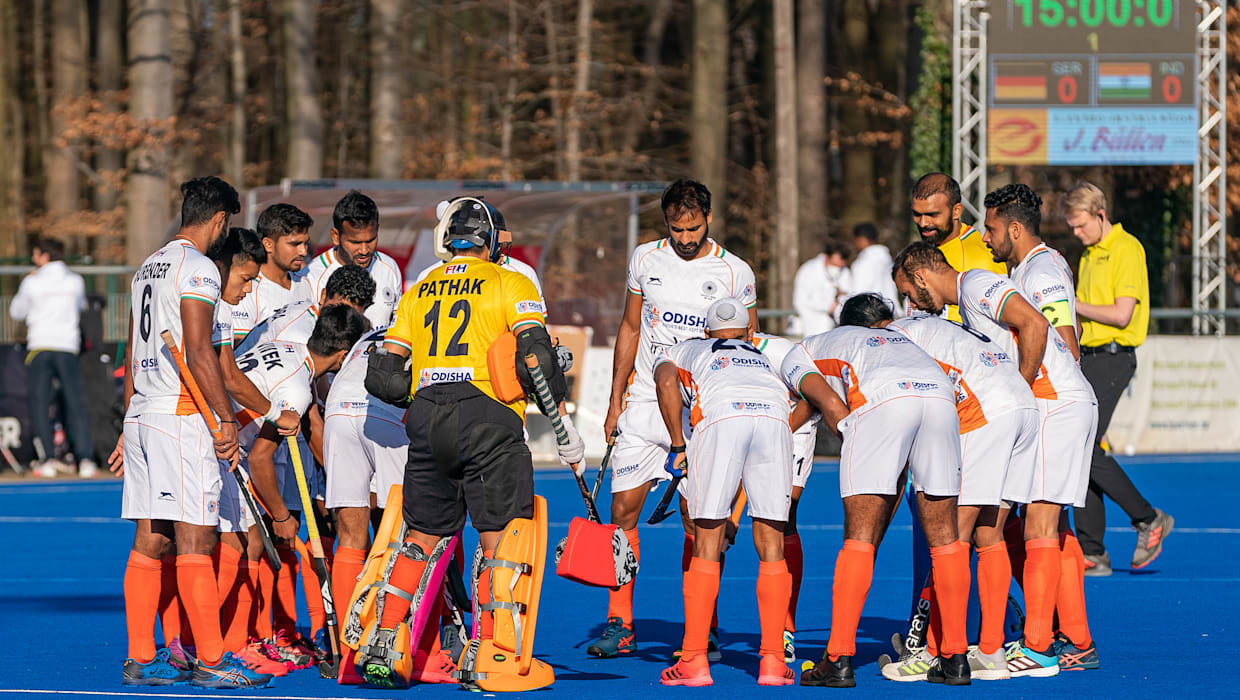News for 14 July 2021
All the news for Wednesday 14 July 2021
2021 Test Matches ESP v NED (M) - 14 July
Madrid (ESP)
Times GMT +2
14 Jul 2021 ESP v NED 3 - 3
15 Jul 2021 10:00 ESP v NED
FIH Match Centre
Olympic Games Tokyo 2020: Spotlight on Germany
In the latest of our Olympic Spotlight feature stories, we focus our gaze on Germany, a European powerhouse with a stellar history at the Olympic Games.
Following their wonderful Olympic bronze medal success at Rio 2016, Germany’s women have continued to look like a team that can challenge the very best in the world. A bronze medal in the inaugural FIH Hockey Pro League and silver medals at the two most recent European Championship events prove that Die Danas – coached by former Belgian international Xavier Reckinger – really are a class act, and they will be looking to get amongst the medals in Japan. Germany faced against Italy in the 2019 FIH Hockey Olympic Qualifiers, comfortably winning both matches to create an emphatic 9-0 aggregate score-line to reach Tokyo 2020.
The trophy haul achieved by Germany’s men’s team – known as ‘Die Honamas’ and coached by Kais al Saadi – down the years is intimidatingly impressive. Their four Olympic gold medals, two World Cups, eight European Championships and nine Champions Trophy titles provides clear evidence of their consistently excellent performances at the highest levels of international hockey. Having medalled at the previous four Olympic Games competitions (including gold at Beijing 2008 and London 2012), they also have a habit of peaking just at the right time. Germany – silver medallists at June’s EuroHockey Championships in Amstelveen (NED) – were comprehensive winners against neighbours Austria in the 2019 FIH Hockey Olympic Qualifiers, winning 5-0 and 5-3 in Mönchengladbach.
We caught up with Germany superstars Charlotte Stapenhorst and Florian Fuchs ahead of their respective title challenges in Tokyo. The interviews were conducted separately whilst the Germany teams were on a pre-Olympic training camp in Valencia, Spain at the end of June.
Thanks for talking to us! The Olympic Games Tokyo 2020 is just weeks away – it has been a long time coming! How are you and your squad feeling ahead of the Games?
Charlotte Stapenhorst: “Feeling really well and definitely excited. We are currently doing our last preparations here in Valencia, but then we are really excited that the Olympics are going to start.”
Florian Fuchs: “Of course everyone is really excited that the Games are going ahead. There were some question marks in the last few months, but we are super excited that we can actually play in Tokyo. It has been a crazy ride. We had a long period in 2020 where we could hardly play any games. When we started in 2020-2021, we were struggling, and hadn’t really progressed, which was also due to the long break we’d had. Now, the team is quite confident. We had a point in March where we played the Dutch team, and things switched. We had a lot more confidence and played well as a team. That was a starting point, and we realised that we can beat and compete with all of the teams at the moment. The Europeans [were Germany won silver] proved that again. That also gives you a boost in terms of motivation in terms of trust in our skills and the team we have. I’m super excited and have a lot of trust and faith in our group. We will show some good hockey, and a lot of emotion and energy.”
Charlotte, you’ve have been lucky enough to stand on the podium at Olympic competition, winning bronze at Rio 2016. What does representing your country on the Olympic stage mean to you?
Charlotte Stapenhorst: “For me, it is pretty much everything. We are putting so much work into what we do and what we love, and that is such a big reward, to go out there and represent our country and, hopefully, stand on the podium.”
Florian, you won Olympic gold at London 2012, when you were just 20 years old. How do you feel looking back at that now?
Florian Fuchs: “When you are that young, it feels like a dream. You immediately continue [with life]. I started studying straight afterwards, and my international career continued, playing tournaments. You are going from tournament to tournament, enjoying it a lot of course and you realise that you have achieved something big. However, corona was also a moment where I realised just how big that [gold in London] really was. There was a period for a couple of months where we actually couldn’t play, and the most important tournament that we were all working towards [Tokyo 2020] was postponed. Suddenly, you are sitting at home – my girlfriend and I never had that much time at home as in normal times I’d travel – and then you’d start talking about these things. You go much deeper, start looking back and watching videos from back then. I think that gives you a different perspective, nine years after that great success. I think corona was a moment where you stopped for a minute and just realised how great that journey was, not just London but also the years after.”
Florian, on the way to winning bronze at Rio 2016, you were involved in that famous win against New Zealand, where Germany produced one of the greatest come-backs in Olympic history. Fighting back from 2-0 down with four minutes to go, you claimed a dramatic 3-2 win thanks to you scoring with the last touch of the game. These are iconic moments for fans and incredible memories for you – competing at the Olympic Games, representing your country, must mean the world to you. After everything that has happened with coronavirus, does it make you appreciate it even more?
Florian Fuchs: “Definitely. I think all of us always appreciated it. You work so hard to get there, to compete at the Olympics. Once the Olympics are over, then you realise how big it is, to compete there. Winning a gold medal, winning a bronze, that is unbelievable, and I think corona made it even bigger. You realise how big that privilege is. We are also very privileged to compete at the [upcoming] Olympics, now that they are actually happening. Staying healthy is of course the most important thing in these times and that has to be taken care of, of course. But considering that we are still in a pandemic, it’s pretty remarkable and of course a great privilege for us to compete there. We are aware of that. We are not going there for the sake of playing – we are also aware that it is really special to be going there after those tough times during that crisis, that we are actually able to compete as athletes and represent our countries.”
It was a while back now, but securing qualification for Tokyo was obviously a crucially important step. What do you remember about your matches in the FIH Olympic Qualifiers?
Charlotte Stapenhorst: “It was two years ago! I was injured and had just been through knee surgery, but obviously being a spectator and watching the games, I can say that the girls were really confident. I knew that we were able to beat Italy. Looking back at it, making sure that we had qualified for the Olympics early helped a lot. Everyone could think ‘I only have to make the squad, we don’t have to worry about qualifying’. It was a good early step. Most, but not all, of the girls knew that we were going to beat Italy. Being on the side-line is so, so frustrating – you are so nervous and cannot really take part. It was hard, but I knew the girls would go through, so that made me feel kind of relaxed on the side-line.”
Florian Fuchs: “You get nervous, of course. It was two games in a tournament setting. We didn’t have much preparation, and it comes down to those two games. We had [former Germany women’s and men’s head coach] Marcus Weise coming back for those games, and he gave us some good insights about the months and years before. That was a new perspective for the team, and I think we did pretty well in the qualifier. We deserved to secure the spot at the Olympics, and it felt pretty good being on the pitch with the team. That is sort of the start of the journey, knowing that you are going to be at the Olympics. It felt like a starting point.”
Die Honamas are in Pool B alongside reigning World champions Belgium, recently crowned European champions the Netherlands, Great Britain, South Africa and Canada, who you begin your campaign against on 24 July. What are your thoughts about the pool, and how important is it to finish as high up the standings as possible ahead of those cross-over quarter-finals?
Florian Fuchs: “It is a tough pool I guess, but every team is super-fit at the Olympics. Every team is determined to make it to the knock-out stages. I think it is pretty cool that we can play Belgium, the Netherlands and England [Great Britain], all teams that we played at the Euros, again. I think that is nice. [Regarding] being ranked high in the group phase, we were ranked first in 2016 and then we played New Zealand [who finished fourth in their pool]. You might think it is easier to play New Zealand, but it wasn’t that way, and we scored a last second goal [to win]. It wasn’t our best game, and we were hoping to play a lot differently, but New Zealand played really well. At the Olympics, it is just a completely different story. You should never think that a better [pool] position or a less good opponent makes things easy. It is never easy to reach the semis at the Olympics, something we experienced in Rio. We were very lucky, and what a game it was. But I don’t want to experience that again!”
Die Danas are in Pool A alongside reigning World champions the Netherlands, current Olympic champions Great Britain, World Cup silver medallists Ireland, India and South Africa. What are your thoughts, Charlotte?
Charlotte Stapenhorst: “We have a really good pool! Obviously being one of the first four is important, to make the quarter-finals. We know that we have to look at ourselves and make sure that every pool game, we come out a little better. We need to make sure that we build up a good tournament, so if the start doesn’t go well, we don’t have to be frustrated as it is a long journey and I hope we will have eight games. Finishing high in the pool is helpful because the other pool is also pretty good! We are looking a little at our [potential] quarter-finals and what the other teams could be, but in the end, we’ll have a look after the last pool game, when everything is settled. We’ll proceed from game to game, I think.”
Finally, you come into the competition on the back of a very strong performance at the EuroHockey Championships, where Germany’s teams won silver. How much confidence does that give you going into the Olympics?
Charlotte Stapenhorst: “A lot. At the end of the game we thought, ok we lost and got the silver medal, but everyone was feeling a little more angry, knowing that we have another chance this summer. It was a good preparation for the Olympics. Five games, high tempo, good nations playing there. The other nations, like Australia and New Zealand, have had Pro League games, but having a tournament right before the Olympics [was great]. At first I thought, ‘that’s going to be too much, it’s going to be really hard’, but now I am really pleased that we had that. It was such good preparation, with everyone having to perform under pressure. That was a really good thing, I think. Everyone knew that in the summer there is a bigger thing coming up. We were disappointed, but everyone knew that this is not the European summer, it’s the Olympic summer.”
Florian Fuchs: “The Euros are hard to compare to Tokyo. There are a lot of other factors that play out at an Olympics. But I think for all of the teams it was a really good test. We had games during the Pro League where there was maybe less pressure on the games, but even under pressure [at the Euros] we didn’t crack. In the semi-final we played really well. I think that was also a moment for the team. We haven’t won important games in a long time. During the World Cup or Europeans, when it came down to the decisive games we were not really that successful in recent years. But this time, we showed some really good hockey and that gives everyone great confidence. As I said, there will be other factors in Tokyo, but the Euros were a booster for us. We will take that positive energy, transfer it to the Olympics and play even better.”
The hockey competitions at the Olympic Games Tokyo 2020 will take place from Saturday 24 July to Friday 6 August 2021. Both the men’s and women’s competitions feature 12 teams, split into two pools of six ahead of quarter-finals, semi-finals and medal matches. For more information about the hockey competitions at the Olympic Games Tokyo 2020, visit https://tokyo2020.org/en/sports/hockey/.
Visit Watch.Hockey App to view the video interviews in full.
#Tokyo2020
#StrongerTogether
#HockeyInvites
FIH site
Varun, Simranjeet added to men’s hockey squad; Namita, Reena in women’s squad
With 18 players allowed per hockey squad at Tokyo, both the men’s and women’s teams have added two new names each to their earlier 16-member squads.
By Rahul Venkat
Picture by Hockey India
Indian hockey players Varun Kumar, Simranjeet Singh and Reena Khokhar could be in line to make their Olympics debuts in Tokyo after being added to the men’s and women’s squads.
Defender Varun Kumar and midfielder Simranjeet Singh were added to the men’s squad for the Tokyo Olympics. Veteran midfielder Namita Toppo, who played at Rio 2016, and young striker Reena Khokhar are now part of the women’s squad.
The team lists can be changed until July 23, when the tournament briefing happens for the Tokyo Olympics.
The International Hockey Federation (FIH)’s Competition Rules for Tokyo 2020 state that each team can take 18 members and a reserve goalkeeper to the Olympics.
However, a matchday squad - the players who will be involved during a given match - can have only 16 members - 11 starters and five substitutes, which will be named an hour before the scheduled start time.
Apart from the 18 players, the competition rules also allow teams to bring in reserve goalkeepers as a ‘Late Athlete Replacement’ (LAR) provided their names have been submitted by the respective National Olympic Committees (NOC) before July 5.
This special provision has been made keeping in mind COVID-19 and the complications it may raise. If the goalkeeper has been replaced by the reserve for a matchday squad using LAR, then the original goalkeeper cannot be brought back for that matchday.
Veteran PR Sreejesh will be starting goalkeeper for the men’s team while vice-captain Savita Punia will be in goal for the women’s team.
Olympic Channel
Varun, Simranjeet late inclusions in Indian men's hockey squad; Reena, Namita in women's team
Hockey India, which had originally named 16-member men's and women's squads for the upcoming Games, have now added two players each in both the teams.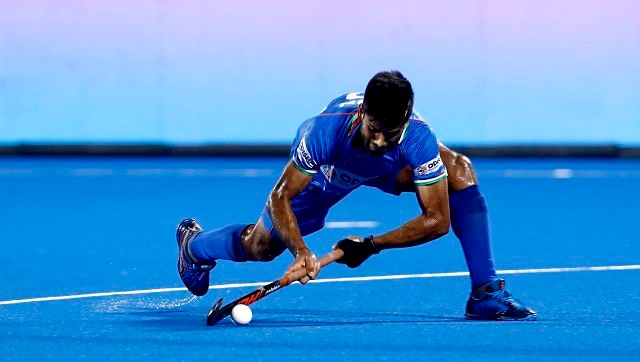
File image of Varun Kumar. Twitter/@TheHockeyIndia
New Delhi: Defender Varun Kumar and mid-fielder Simranjeet Singh are set to make their Olympic debuts after they were added to India's men's hockey squad following the IOC's decision to allow "alternate athletes" in team events because of the COVID-19 pandemic.
Hockey India, which had originally named 16-member men's and women's squads for the upcoming Games, have now added two players each in both the teams.
While Varun and Simranjeet were late inclusions in the men's team, defender Reena Khokhar and experienced mid-fielder Namita Toppo were added to the women's side.
"Varun and Simranjeet have been added to the 16-member side. Now it is an 18-member side. Though they are additional, both of them are up for selection in every match as per IOC's special guidelines for Tokyo 2020," a source told PTI.
Traditionally, hockey teams in Olympics comprise 16 players each but the International Olympic Committee (IOC) has made an exception this time around, allowing every competing nation to have two extra players in their squads for the COVID-hit Summer Games.
As per the IOC, the sports in which "alternate athletes" will be able to replace permanent players in each match are hockey, football, handball, rugby and water polo.
In previous Olympics, stand-by players used to travel with hockey teams but could only take part in the Games in case a player in the 16-member squad suffers an injury or is out of the Games permanently.
Despite the additions, only 16 players will be able to play in a match and the teams will have to submit their list a day before their games.
While Varun, Simranjeet and Reena will be competing in their maiden Olympics, Namita was part of the women's hockey team that qualified for the 2016 Rio Olympics after a hiatus of 36 years.
Drag-flicker Varun, a member of India's 2016 Junior World Cup-winning side, will give eight-time gold medallist India another penalty corner option alongside the likes of Harmanpreet Singh, Rupinder Pal Singh and Amit Rohidas.
Simranjeet will strengthen India's mid-field to be led by skipper Manpreet Singh.
Simranjeet, a product of Jalandhar's Surhit Singh Hockey Academy, was also a member of India's 2016 Junior World Cup-winning side.
His cousin and junior World Cup teammate Gurjant Singh is also a part of the Tokyo-bound squad.
Firstpost
Tokyo Olympics Hockey: Full men’s and women’s squads and coaches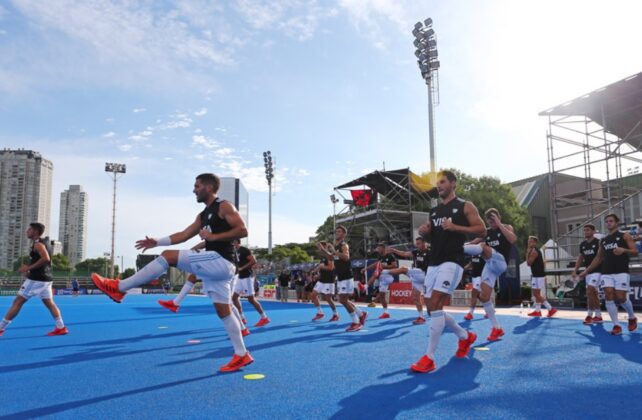
All the squad listings for the men’s and women’s Tokyo 2020 Olympic Games hockey competition at the Oi Hockey Stadium, starting July 24.
"Finishing PC conversions, avoiding yellow cards crucial"; says Baskaran
K ARUMUGAM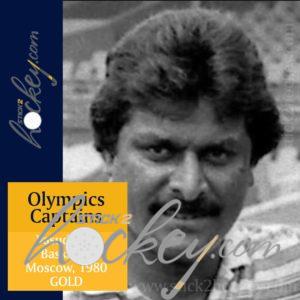
Vasudevan Baskaran, captain of the 1980 Moscow Olympic gold medal winning team has waited in vain for decades for India to deliver another medal of any colour.
But he hasn’t lost hope as he looks forward to Tokyo 2020 and makes his notes about the India squad who, like in any Olympics, face an arduous task to finish on the podium.
“To me, the Indian team is well prepared when compared to the other 11.
“Still, I will express my take on the prospects of a podium finish. Firstly, remember from the mental point of view, this Olympics is different from any in the past in the wake of challenges that the Covid-19 pandemic has presented. The players must be prepared for this campaign with a clear mind. Mental strength and preparedness will count for a lot”.
Baskaran, who in his heyday manned the left-half position with aplomb, then looked at the competition proper. “Winning our opener against New Zealand is of immense importance. A winning start in any global event sets the tone for a successful campaign,” he said.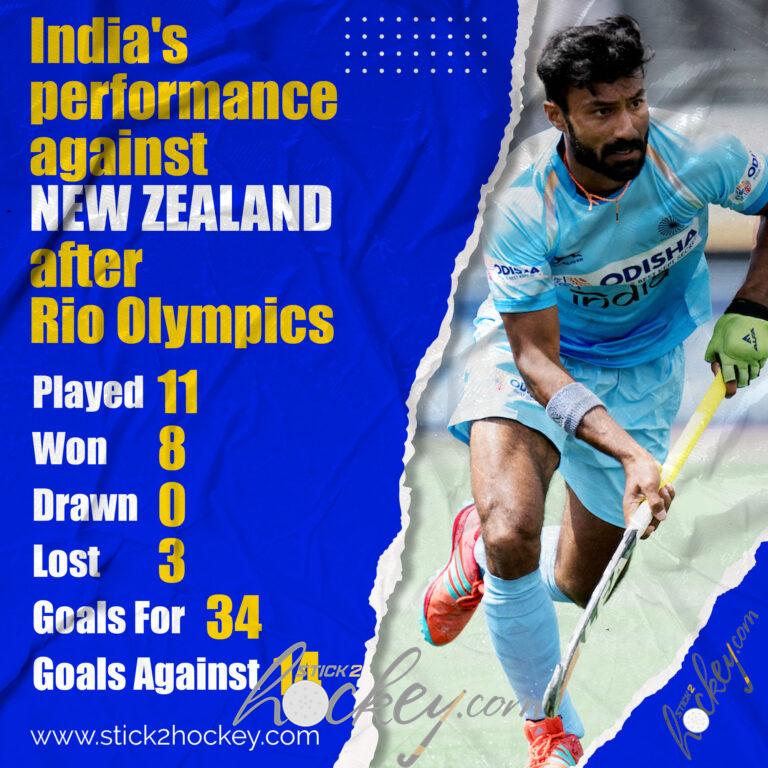
Winning the opener against New Zealand is crucial, says Baskaran
Baskaran knows too well that Indian teams in the past often didn’t justify ascendancy on the pitch with goals on the scoreboard. “It’s of paramount importance that we finish well. Spurning scoring chances will cost us dear. Much depends on sharpness and presence of mind in the circle,” the former Railways and Tamil Nadu stalwart affirmed.
Inevitably, the Chennai-based icon drew a correlation between winning and the ability to convert penalty corners.
“Penalty corner conversions are a crucial facet of the game. The awards are potent and can often swing momentum in a game. In the final analysis, usually teams that have a healthy conversion rate stride to the podium.
Conversely, according to Baskaran, the avoidance of conceding penalty corners determine the fate of matches. Also, in the context of the modern game, unforced errors in the defensive quarter of the pitch (beyond the 23m line) may be perilous and the team would do well to keep them to a minimum.
Baskaran also drew attention to temporary suspensions, especially the yellow card which stipulates a minimum of five minutes in the sin bin — something that has done Indian teams in on numerous occasions.
“With a team reduces by a player (or more), yellow card suspensions bring on tremendous pressure in this day and age of the self-pass and relentless pace brought on by rolling substitutions,” Baskaran said.
“In a tough campaign like the Olympics, a performance level of 80 percent is a must to retain consistency over a nearly fortnight’s duration.
“Above all, though, it’s confidence that will be significant. I urge the players to enter the Olympic Village with confidence. Rest assured, then, that all will fall in place,” the Arjuna awardee declared.
“And that goes for the women’s team as well besides all our sportspersons who will be in Tokyo. It’s a sincere message from a proud India,” Baskaran said, signing off.
CLICK THIS LINK FOR BASKARAN’S VIEW ON TOKYO TEAM
Stick2Hockey.com
Indian hockey team can break medal drought in Olympics 2021: Dhanraj Pillay
Dhanraj Pillay believes the supremely fit Indian Hockey team going for the Tokyo Olympics has what it takes to finish on the podium and end the medal drought which his generation of players could not
An Olympic medal missing from his own cupboard, Indian hockey great Dhanraj Pillay believes the supremely fit team going for the upcoming Tokyo Games has what it takes to finish on the podium and end the medal drought which his generation of players could not.
Pillay, who represented India in four consecutive Olympics from 1992 to 2004, said fitness is the key asset of the Manpreet Singh-led side going into the Summer Games that begins on July 23 in Tokyo.
"I am very confident they will do it this time. They have been doing well in the last 5 years. Fitness is their biggest asset. In those days, we didn't have the kind of support system they have now," the 52-year-old Pillay was quoted as saying in Hockey India's Flashback Series.
"This team has done wonders, won hearts of millions of fans with their recent performances, particularly at the Champions Trophy (in 2016 and 2018) and the World League Finals (2015 and 2017). I know they can do it this time," he added.
Unable to meet the team personally because of the strict COVID-19 protocols, Pillay has sent letter to Manpreet and women's skipper Rani Rampal, wishing both the teams good luck and success in Tokyo.
"Since I am also in Bangalore, I would have loved to meet them in person but due to protocols, I did not. I sent them a letter wishing them the very best and I wanted to convey to them that they should be careful about their diet when they are in the Olympic village.
"I wanted to convey to them that they should enjoy the best part of their athletic life by being calm and relaxed," he said.
"To both men and women's team, I want to say, don't think about the podium finish. Go match-by-match and stick together as one unit right until the last day, the last match of the tournament."
Pillay advised both the Tokyo-bound teams not to think too far ahead.
"I think the mistake we did at every Olympic Games was that we went with the mind set of aiming for the final instead of taking it match-by-match.
"Though we had the best teams each time, things did not materialise for us to finish on the podium," he signed off.
Business Standard
Inaugural FIH World Hockey5s event in Lausanne to be staged in 2022
Photo credit: Swiss Hockey Association
Due to the ongoing uncertainties surrounding the evolution of the global COVID-19 pandemic, the International Hockey Federation (FIH) has decided to postpone its ‘FIH Hockey5s Lausanne 2021’ event, initially planned in September this year, to 2022.
FIH CEO Thierry Weil said: “Whilst it is of course disappointing to have to delay this event by one year, especially considering the role it is meant to play for the exposure of Hockey5s globally, we came to the conclusion that it was the best decision in order, precisely, to preserve the full promotion potential of this event. I’d like to extend sincere thanks to all stakeholders who have considerably helped us so far, and in particular the City of Lausanne, the canton of Vaud, the Fond du Sport Vaudois, the Swiss Hockey Association, our partners and all teams who had confirmed their participation. I look forward to pursuing our preparations together and invite all hockey fans to join us next year!”
Next year’s event, which will be staged on the Place de la Navigation - an iconic location near the Lac Léman bordering the Olympic Capital -, will provide an exciting mix of intense competition, music entertainment and additional activities, such as an initiation to hockey for the public. Access will be free of charge and the tournaments, Men’s and Women’s, will be broadcasted live across the world on the Watch.Hockey platform.
For more information about FIH and hockey in general, please download the Watch.Hockey app, event website and through FIH social media channels - Facebook, Instagram and Twitter.
#Hockey5s
FIH site
CNS Cup All Pakistan Hockey from August 1 in Karachi
LAHORE: The third Chief of Naval Staff (CNS) Cup All Pakistan Hockey Tournament will be played from August 1 to 8 in Karachi.
National Bank of Pakistan are the defending champions.
The Pakistan Hockey Federation (PHF) has appointed event umpires and officials. Olympian Nasir Ali will be the tournament director and Masood-ur-Rehman will be the umpire manager.
The tournament officers will be Mubashir Mukhtar (HBL), Dr SA Majid (Karachi), Dr Abdul Rasool Januri (Dadu), Murtaza Dhot (Khairpur), Ghulam Mustafa (Hyderabad), Asim Khan (Karachi), Zahid Mahmood (Karachi), Anis Khan (Karachi), Wakiluddin Qazi (Karachi) and Tariq Khan (Karachi).
Mohsin Ali Khan (Karachi) will be the assistant umpires manager.
The meeting of event officials will be held under the chairmanship of Nasir at Abdul Sattar Edhi Hockey Stadium on July 31 at 3pm.
The News International
Pakistan's hockey World Cup winner Naved Alam dies aged 47
Alam, an outspoken person who was a key member of the Pakistan team that last won the World Cup in 1994, was diagnosed with blood cancer only a few days back
Naveed Alam in 1998. | Photo Credit: SUDERSHAN V
Pakistan's well-known hockey World Cup winner, Naved Alam, died on Tuesday in Lahore, barely few days after being diagnosed with blood cancer. He was 47.
Alam, an outspoken person who was a key member of the Pakistan team that last won the World Cup in 1994, was diagnosed with blood cancer only a few days back when he checked into a hospital after feeling unwell.
"It is with sadness that we announce that Naved Alam has passed away today after a battle with cancer," his family announced.
Naved, a strong fullback had just started his chemotherapy in Lahore on Monday, after which his condition deteriorated.
The Sindh government had written to the hospital, confirming they would bear all expenses for his treatment, but the game's former stalwarts took the Pakistan Hockey Federation to task for not coming forward to help the Olympian who featured in the 1996 Atlanta Games.
A former secretary of the Pakistan Hockey Federation (PHF), Col Mudassar Asghar said it was unfortunate that despite serving Pakistan and winning a World Cup, Naved needed financial and moral help from the government, the PHF and from other hockey stakeholders after being diagnosed with cancer.
Naved also served as Pakistan's hockey team manager at the Beijing Olympic Games in 2008.
The Pakistan Hockey Federation (PHF) had appointed Naved as director development and domestic in 2016 but they fell out over several issues.
The fullback also coached Bangladesh for sometime.
PHF secretary, Asif Bajwa, expressed his condolences and said he, Naved and another Olympian, Danish Kaleem, were very close while playing for the national team for 10 years.
"It is very sad today as we have lost a stalwart in our hockey family," he said.
The Pakistan Cricket Board also issued a condolence message, expressing sadness at Naved's demise.
The Hindu
Former hockey star Naveed Alam passes away after battle with cancer
Imran Siddique
Noted Olympian and a member of Pakistan’s winning team in the 1994 Hockey World Cup, Naveed Alam, passed away after a battle with cancer on Tuesday, his family said. He was 47.
Alam, who was recently diagnosed with blood cancer, underwent chemotherapy in Lahore yesterday, after which his condition deteriorated. He was immediately moved to a hospital where he passed away.
Four days ago, former secretary of the Pakistan Hockey Federation (PHF), retired Col Mudassar Asghar, had urged the government and the PHF to help out Alam, who had been diagnosed with blood cancer recently.
“Naveed was a member of Pakistan’s 1994 World Cup winning team; he was a fighter and fine full-back. At this stage, Naveed needs financial and moral help from the government and the PHF and from other hockey stakeholders as anyone can face these kinds of hardship in life,” former Olympian Mudassar had said.
The Pakistan Cricket Board also expressed grief on Alam's demise.
Alam had also served as Pakistan’s hockey team manager at the Beijing Olympic Games in 2008. Pakistan had finished eighth at the 2008 Olympics after which he remained caught up in a legal battle over the PHF elections in which Qasim Zia and Asif Bajwa were elected as president and secretary, respectively.
The Pakistan Hockey Federation (PHF) had also appointed Alam as director development and domestic in 2016.
Dawn
Former hockey Olympian Naveed Alam dies of blood cancer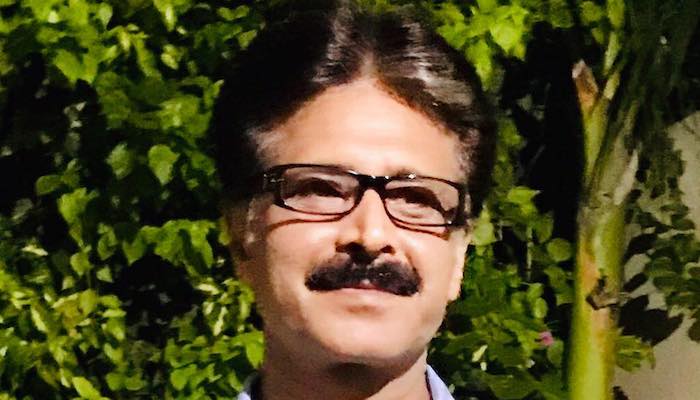
Former hockey Olympian Naveed Alam has died of blood cancer, Geo News reported Tuesday. He was 47 years old
Alam, a member of the winning team of the 1994 World Cup, was diagnosed with blood cancer earlier this month.
His daughter said he underwent chemotherapy at Shaukat Khanum Hospital, Lahore last night and his health deteriorated after it.
He was transferred to the intensive-care unit after his health deteriorated, his daughter said.
His family had revealed earlier this month that the former sportsman was feeling unwell for several days and went to Shaukat Khanum Memorial Hospital where doctors learned of his illness.
The Punjab CM had assured that the expense of Alam's treatment would be borne by the Punjab government.
His funeral prayers will be held at 10pm tonight, the Pakistan Hockey Federation (PHF) confirmed. It will take place at Company Bagh in Sheikhupura.
PHF Secretary-General Asif Bajwa, Manzoor Junior, Asif Naz and Khawaja Junaid will attend the funeral prayers, PHF's statement read.
The 1996 Summer Olympics participant coached the teams of Pakistan, China and Bangladesh.
The News International
